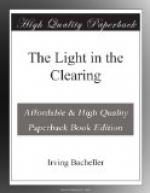The ladies laughed.
“It’s lucky,” said Mrs. Wright. “Doesn’t Horace Dunkelberg know about him?”
“I suppose he does, but the man is money crazy.”
I couldn’t help hearing it, for I was working in the room in which they talked. Well, really, it doesn’t matter much now. They are all gone.
“Who is young Latour?” I asked when Mrs. Jenison had left us.
“A rake and dissolute young man whose father is very rich and lives in a great mansion over in Jefferson County,” Mrs. Wright answered.
I wondered then if there had been a purpose in that drop of honey from the cup of the Silent Woman.
I remember that the Senator, who returned to Canton that evening on the Watertown stage, laughed heartily when, as we were sitting by the fireside, Mrs. Wright told of the call of the Binkses.
“The good lady enjoys a singular plurality,” he remarked.
“She enjoys it better than we do,” said Mrs. Wright.
The Senator had greeted me with a fatherly warmth. Again I felt that strong appeal to my eye in his broadcloth and fine linen and beaver hat and in the splendid dignity and courtesy of his manners.
“I’ve had good reports of you, Bart, and I’m very glad to see you,” he said.
“I believe your own marks have been excellent in the last year,” I ventured.
“Poorer than I could wish. The teacher has been very kind to me,” he laughed. “What have you been studying?”
“Latin (I always mentioned the Latin first), Algebra, Arithmetic, Grammar, Geography and History.”
“Including the history of the Binkses,” he laughed.
There was never a note of humor in his speeches, but he was playful in his talk at times, especially when trusted friends were with him.
“She is a very excellent woman, after all,” he added.
He asked about my aunt and uncle and I told him of all that had befallen us, save the one thing of which I had spoken only with them and Sally.
“I shall go up to see them soon,” he said.
The people of the little village had learned that he preferred to be let alone when he had just returned over the long, wearisome way from the scene of his labors. So we had the evening to ourselves.
I remember my keen interest in his account of riding from Albany to Utica on the new railroads. He spoke with enthusiasm of the smoothness and swiftness of the journey.
“With no mishap they now make it in about a half a day,” he said, as we listened with wonder. “It is like riding in a house with a good deal of smoke coming out of the chimney and in at the windows. You sit on a comfortable bench with a back and a foot-rest in front and look out of the window and ride. But I tremble sometimes to think of what might happen with all that weight and speed.




